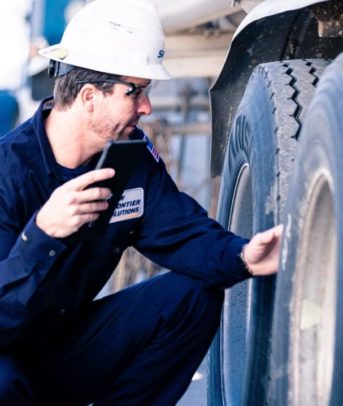Telematics is the current buzzword in the automotive and transportation industries. It dominated the 2015 Mid-America Trucking Show this spring, and it’s not hard to see why. Using telematics systems, trucking companies can now rely on a single solution to improve efficiency and reduce trucking costs across a number of crucial areas.
Airlines already use black box technology, a form of telematics, to analyze flight data in the event of a damaged or missing plane. The trucking industry can use telematics technology to allow fleet administrators to easily streamline communications, report progress in real time, track compliance with federal regulations and enhance security. Samsung and Comply365 are partnering to integrate telematics in mobile platform solutions, helping trucking companies operate more effectively.
Seamless Communication Across Devices
Pre-existing equipment can be used to send data to one central access point. GPS devices, laptops and Samsung Galaxy® tablets and smartphones are all telematic devices due to their data-collection and communication capabilities. However, many organizations purchase costly and redundant solutions without understanding what they already have. These devices can populate company databases over a Wi-Fi® connection with important logistics information, aiding scheduling and accounting in the process. Similarly, operations can quickly upload everything from permits and manuals to checklists and routes, which drivers can access on the go. Comply 365 offers automated distribution, which gives drivers instant digital access to everything they need without having to sift through stacks of papers. It’s also easy to communicate or make key decisions with coworkers, no matter where they are or what device they’re using.
Real-Time Reporting
Using telematics technology to track, store and analyze driver and vehicle data, fleet managers are able to improve fuel economy and emissions by critiquing driving technique. Similar to insurer-installed consumer black boxes, mobile device-based trucking intelligence platforms can detect when drivers are pressing the brakes too hard, shifting gears improperly or idling for long periods of time. Through this technology, companies can identify and correct wasteful behavior to comply with evolving government regulations.
Compliance Tracking
Several fleet manufacturers are preparing for a possible decline in orders due to Hours of Service (HOS) regulations. Fleets are struggling to find cost-effective ways to maintain compliance while continuing operations. This year’s changes in HOS rules include a suspension on the 34-hour restart rule while the Department of Transportation studies different variations of the regulation. This can cause confusion as drivers attempt to work within the law. Comply365 and Samsung have introduced built-in compliance tracking and automated reports to save time and improve accuracy.
Enhanced Security
The safety of truck drivers depends on more than just their ability to drive a truck. Much like a brick-and-mortar store needs an alarm system and remote monitoring, a shipment in transit needs telematic security. GPS monitoring ensures that a shipment can be traced in the event of theft. The moment a truck veers off its plotted course, the anomaly is detected. Just as GPS trackers assist in notifying law enforcement and locating missing property, video and audio monitoring helps identify the culprit, thereby minimizing losses and trucking costs while increasing driver safety.
Enterprise risk management strategies are being developed globally to ensure that business can move forward. Mobile connection is a common factor in many. Telematics isn’t just the word of the day; it’s a game-changing technology that provides organizations with real-time data necessary for instant communication and streamlined reporting. Combining vehicle telematics with cutting-edge mobility solutions is the next big thing in the trucking industry, and it may be the key to keep your business thriving.








